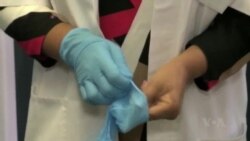South Africa has just launched a multi-year trial of a vaccine that might save millions of lives and help put an end to AIDS. It’s the first AIDS vaccine trial in seven years, and hopes are high, not just in South Africa, but around the world.
The search for an AIDS vaccine has been long and frustrating. Dr. Anthony Fauci at the National Institutes of Health has spent his career studying HIV, the virus that causes AIDS. His agency is co-funding the trial.
“The challenge that we have with an HIV vaccine is much different than the challenges we have with any other vaccine,” Fauci said, explaining that with other viruses, such as polio or measles, the body begins to fight the infection on its own.
To develop a vaccine, scientists find a way to mimic the virus so the body makes an immune response to protect itself, so it’s ready to recognize and resist a future infection.
“With HIV, that’s not the case for a number of reasons, some of which we don’t understand. The body does not make naturally, an adequate, good immune response against HIV,” Fauci said.
Thailand trial offered hope
A few years ago, an experimental HIV vaccine was tried in Thailand. It cut the risk of infection by 31 percent, not good enough to produce a vaccine, but good enough for scientists to think they were on to something. Fauci says it provided proof of concept.
“What the investigators did following the Thailand trial,” he said, “is that they looked to see if there was any correlate [commonality] of any particular type of response that the vaccinees got with protection. They found that there are a couple of things that they identified that were called correlates of immunity.” Those are signs that those who participated in the trial had developed some protection against HIV.
For many viruses, antibodies serve as a correlate of immunity. This is not so for HIV, because those infected with the virus develop antibodies without being protected from the disease.
For the trial in South Africa, scientists produced a strengthened version of the vaccine used in Thailand. It was modified because the strain of HIV in South Africa is not the same as the strain in Thailand.
Earlier this year, a small study showed that the vaccine candidate was safe and promising enough to use in a major study.
South Africa results to take years
This trial, called HVTN 702, aims to enroll 5,400 sexually active men and women, making it the largest and most advanced HIV vaccine clinical trial to take place in South Africa. Some participants will receive the investigational vaccine; others, a placebo. All will be counseled on how to avoid getting the HIV virus.
The results of the trial won’t be known for at least three years, but in order for it to be successful, the vaccine has to protect at least half of those who get it.
“Even a moderately effective vaccine would significantly decrease the burden of HIV disease over time in countries and populations with high rates of HIV infection, such as South Africa,” Fauci said.
In South Africa, 19 percent of adults have HIV and more than 1,000 people become infected with the virus every day.
But Fauci is mindful that just because this vaccine candidate shows promise, that doesn’t mean it will succeed.
“We have no idea whether it will work or not,” he said. “Any time you do a vaccine trial, more vaccine trials fail than are successful.”
But if it does work and if it offers 50 to 60 percent protection against HIV, Fauci says the vaccine, along with proven HIV prevention tools, “could be the final nail in the coffin for HIV.”






